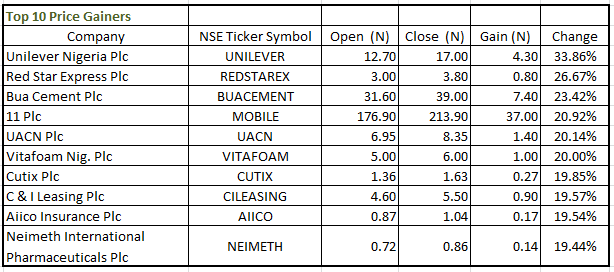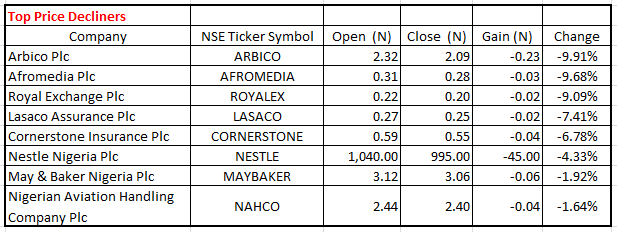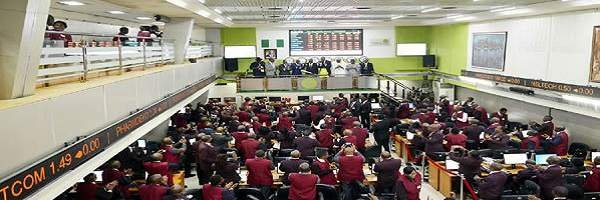Equity Investors in the Nigerian Stock Exchange (NSE) enjoyed a week of strong gains that saw the All-Share Index (ASI) move from 23,872.44 at the last trading session in the preceding week, to 25,204.75 points on the last trading day of the week in review.
The bull run saw the NSE-ASI recover most of the loses suffered this year, and added N694.33 to the Market Capitalization. The month of May has been particularly good for equity investors, as they have seen their wealth albeit on paper, increase by N2.03 trillion.
A total turnover of 1.718 billion shares worth N18.849 billion in 26,367 deals were traded this week by investors on the floor of the Exchange, in contrast to a total of 926.418 million shares valued at N9.768 billion that exchanged hands last week in 20,910 deals.
Read also; WHO Suspends Hydroxychloroquine Trial over Safety Concerns; 229 new cases Recorded in Nigeria
A review of the activity levels by Analysts at Investogist shows a moderately declining volume and value of shares traded over the course of the year. Despite a steep decline in the all share index in March, the appetite for Nigerian stocks even increased, as domestic investors stepped in to scoop up the shares as they became available at lower and lower prices.

Fig 1: The trend on the Nigerian Stock Exchange, Year To Date: All Share Index – Volume of Shares trade – Value of Shares traded
On 4 May, 2020, Investogist reported that while the total Foreign Portfolio Investment outflow for the year increased by 50% to N186.6 billion up from N124.2 billion, the domestic transactions by retail investors increased by 103.7% to N60.22 billion from the N29.56 billion recorded in February 2020.
Read; Corporate Actions for the Week ended 22 May 2020
A total turnover of 1.718 billion shares worth N18.849 billion in 26,367 deals were traded this week by investors on the floor of the Exchange, in contrast to a total of 926.418 million shares valued at N9.768 billion that exchanged hands last week in 20,910 deals.
The Financial Services industry (measured by volume) led the activity chart with 1.273 billion shares valued at N11.362 billion traded in 13,808 deals; thus contributing 74.08% and 60.28% to the total equity turnover volume and value respectively. The Industrial Goods industry followed with 102.377 million shares worth N3.194 billion in 2,956 deals. The third place was the Healthcare industry, with a turnover of 99.620 million shares worth N493.348 million in 1,194 deals.
Trading in the Top Three Equities namely Zenith Bank Plc, Access Bank and FBN Holdings Plc. (measured by volume) accounted for 673.104 million shares worth N6.803 billion in 5,927 deals, contributing 39.18% and 36.09% to the total equity turnover volume and value respectively.
The NSE All-Share Index (ASI): An index is an imaginary portfolio of securities representing a particular market or a proportion of the market. The Nigerian Stock Exchange All-Share Index (NSE ASI) tracks the general movement of all listed equities on the Nigerian Stock Exchange.
Read more; Nigeria’s Real GDP Grew by 1.87% in Q1 2020
The top performing stocks in the week was the Industrial Goods Index, while the Consumer Goods Index was the least performing index. All indices under our watch closed the week positively.

Fig 2: The performance of the NSE All-Share Index and major indices under our watch
Unilever Nigeria Plc was the top gainer for the week, followed by Red Star Express Plc, below is a table of the top 10 gainers for the week.

Fig 3: Top 10 gainers for the week
Penny stocks dominated top echelons of the losers table, while some fundamentally sound stocks occupied the lower parts of the table. Below is a table of the only stocks that closed the week in negative.

Table 4: Losers for the week
Fifty-five (55) equities appreciated in price during the week, higher than thirty-two (32) equities in the previous week. Eight (8) equities depreciated in price, lower than twenty-eight (28) equities in the previous week, while one hundred (100) equities remained unchanged, lower than one hundred and three (103) equities recorded in the preceding week.
Oil prices have risen significantly over the past couple of weeks, as countries continue opening up after the lockdowns necessitated by the coronavirus pandemic. The fears of a recession still hangs over the country, and this was echoed by the Finance Minister at the National Executive Council (NEC) held on Thursday, 21st May, 2020.
Read; Nigeria Headed for a Deeper Recession, to Shrink by 8.9%: Finance Minister
First quarter results continue to roll in with no impact of the coronavirus, most are expecting to see the impact from the next quarter.
Outlook:
The market continues to be on a delicate balance, with economic projections painting a recession that will be worse than last financial crisis, and based on that we do not have faith that the current bull run will continue in the near term.
However, there are several stocks still below the fair value prices, and Investor’s will be better served to invest only in fundamentally sound stocks, as the company will withstand any recession and bounce back faster than the fundamentally weak stocks.
Written by;
Nnamdi M.





















































